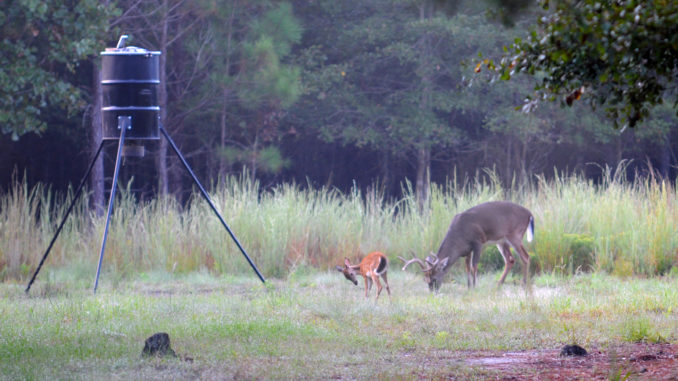
Legislation has fast-tracked through Senate, House, may get final approval this week
A bill to delete wording in state law that prohibits baiting for deer in the Upstate has been on a fast track in the current legislative session and appears headed for final approval this week.
The issue of whether baiting is legal in Game Zones 1 and 2, which cover most of the Upstate, arose after the legislature took over regulation of hunting rules from the S.C. Department of Natural Resources in 2008. Most of SCDNR’s hunting rules were picked up verbatim, but a phrase was dropped that had prohibited baiting for deer. With the omission, the law no longer made it illegal to hunt deer over bait while still prohibiting putting out bait for deer.
After a magistrate’s ruling on the issue, which was subsequently upheld by the state’s attorney general, it became impossible to prosecute Upstate hunters for hunting over bait. After averaging about 350 tickets a year for the offense, wildlife officers wrote no upstate baiting tickets last year.
Sen. Greg Gregory, R-Lancaster, pre-filed the bill, which simply deletes the prohibition on baiting in Game Zones 1 and 2. It was reported favorably out of the Senate Fish, Game and Forestry Committee on Jan. 17, passed the full Senate five days later and was sent to the House, where the Agriculture, Natural Resources and Environmental Affairs Committee issued a favorable report Feb. 7.
While Gregory’s bill would clarify state law on baiting for deer in the Upstate, it does not sit well with many sportsmen and wildlife managers.
Benton Wislinski, lobbyist for the S.C. Wildlife Federation and the S.C. Camo Coalition, said he expects the bill to pass easily in a House floor vote later this week.
“But it definitely was a source of much controversy on the Senate side – with much heated debate and concerns,” Wislinski said, adding that the wildlife federation is opposed to baiting from both and ethical and game management perspectives.
“Repeated studies by game biologists at the S.C. Department of Natural Resources show that baiting can be destructive to herd health, and that fair chase without baiting increases overall hunter success,” he said.
“That said, (SCDNR) conservation officers are currently in a legal bind when it comes to enforcing the current baiting laws, and things were further complicated by a recent (attorney general’s) opinion. So, in the short term, SCWF will not oppose this legislative fix, but we believe the legislature needs to give serious study to the wisdom of baiting in the long-term.”
Kip Adams, director of Education and Outreach for the Quality Deer Management Association, said several aspects of baiting are cause for concern, including transmission of diseases, alteration of deer movement patterns, impacts on surrounding habitat, impacts on hunter skill and success, social and ethical issues, and legal and enforcement issues.
And, he warned, hunters must always be cognizant of how their actions are perceived by the general public.
“Data from the National Shooting Sports Foundation and Responsive Management shows that while 73 percent of the U.S. public supports hunting, only 27 percent support hunting over bait,” Adams said.
And, while many hunters want to be able to hunt over bait which is legal in most of the Lowcountry because of long-standing hunting tradition there, studies show hunting success is less in those areas.
Joe Hamilton of Walterboro, a wildlife biologist and the founder of QDMA, cited harvest reports from Georgia showing hunters in areas where baiting was illegal averaged 1.25 to 1.26 deer per season, while those who hunted where baiting is legal only averaged .72 deer per season.
“By comparison, Charles Ruth (SCDNR Deer and Turkey Project supervisor) conducted an analysis of deer hunting efficiency in South Carolina and reported similar results. Hunters in the Upstate where baiting was illegal spent less time harvesting deer than those hunters in the Lowcountry where it is not illegal to bait,” said Hamilton, who noted that QDMA does not oppose baiting in areas where it is legal or allowed by tradition such as the Lowcountry.



Be the first to comment